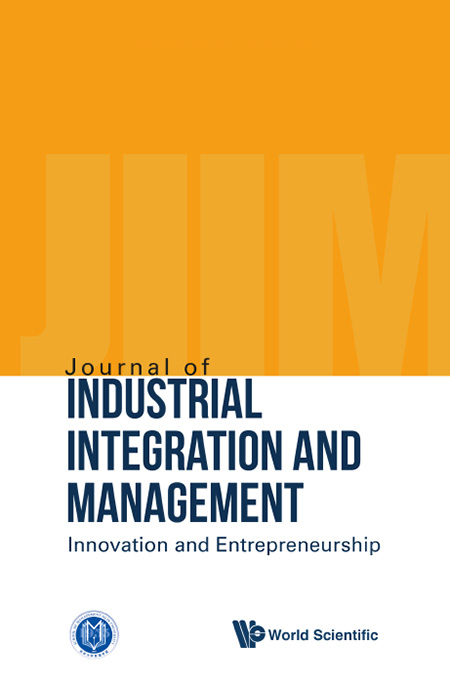Measuring Perceived Service Innovation Typologies in Retail Industry
IF 3.3
Q2 MANAGEMENT
Journal of Industrial Integration and Management-Innovation and Entrepreneurship
Pub Date : 2018-12-04
DOI:10.1142/S2424862218500197
引用次数: 5
Abstract
Purpose: The study is undertaken with two objectives, first to develop a scale that can measure service innovation from customer perspective in retail industry, and second to find out how the developed service innovation measurement scale has an effect on predicting customer’s Word-of-Mouth (WOM), followed by testing the mediation effect of corporate reputation between service innovation and WOM. Methodology: The study followed the Integrated Design Approach that included qualitative studies and quantitative studies in exploring and validating the measurement items for service innovation typologies. The codes that represent the typologies of service innovation were elicited through group discussions with selected customers and validated through in-depth interviews with decision maker/managers of retail industry in different parts of South India. The approved codes were validated through two expert opinion surveys and further authenticated through quantitative approaches such as: Exploratory Factor Analysis and Confirmatory Factor Analysis with two different sets of samples. Finally, the nomological validity of the developed scale was tested on estimating its effect on Corporate Reputation and WOM. Findings: The developed service innovation scale can be adopted by both researchers and managers in measuring service innovation in retail industry. The path analysis results concluded that service innovation has positive impact on corporate reputation and WOM, where the decision makers/managers can note that if service innovations are brought in frequently, it would make the firm reputed in the market and ultimately results in positive WOM from the customers. The mediation analysis result also gives an insight that even if the service innovation is by a non-reputed retailer, it still gets positive WOM. Originality/Value: The study contributes by providing a unique scale to measure service innovation from customer perspective in retail industry, overcoming the existing Goods-Dominant logic. Further, by empirically testing nomological validity, the effect on non-financial performance is estimated to understand how innovation in services would build corporate reputation that ultimately results in customers’ positive WOM which is wanting in literature on service innovation.零售业感知服务创新类型的测量
目的:本研究的目的有两个,一是开发一套能够从顾客角度衡量零售业服务创新的量表,二是研究开发的服务创新测量量表对顾客口碑(word -of-口碑)的预测效果,然后检验企业声誉在服务创新与口碑之间的中介作用。研究方法:采用定性研究和定量研究相结合的综合设计方法,对服务创新类型的测量项目进行了探索和验证。代表服务创新类型的代码是通过与选定客户的小组讨论得出的,并通过对南印度不同地区零售业决策者/经理的深入访谈进行验证。通过两次专家意见调查对批准的代码进行验证,并通过两组不同样本的探索性因子分析和验证性因子分析等定量方法进一步验证。最后,对编制的量表进行了法效度检验,以评估其对企业声誉和口碑的影响。研究发现:编制的服务创新量表可被研究人员和管理人员用于衡量零售业的服务创新。路径分析结果表明,服务创新对企业声誉和口碑有积极的影响,决策者/管理者可以注意到,如果经常引入服务创新,将使企业在市场上获得声誉,最终导致客户的积极口碑。中介分析的结果也让我们看到,即使服务创新是由一个不知名的零售商进行的,它仍然会获得积极的口碑。原创性/价值:本研究提供了一个独特的尺度来衡量零售行业的服务创新,克服了现有的商品主导逻辑。此外,通过实证检验法效度,估计对非财务绩效的影响,以了解服务创新如何建立企业声誉,最终导致客户的积极口碑,这是服务创新文献中所需要的。
本文章由计算机程序翻译,如有差异,请以英文原文为准。
求助全文
约1分钟内获得全文
求助全文
来源期刊
CiteScore
17.00
自引率
16.70%
发文量
31
期刊介绍:
The Journal of Industrial Integration and Management: Innovation & Entrepreneurship concentrates on the technological innovation and entrepreneurship within the ongoing transition toward industrial integration and informatization. This journal strives to offer insights into challenges, issues, and solutions associated with industrial integration and informatization, providing an interdisciplinary platform for researchers, practitioners, and policymakers to engage in discussions from the perspectives of innovation and entrepreneurship.
Welcoming contributions, The Journal of Industrial Integration and Management: Innovation & Entrepreneurship seeks papers addressing innovation and entrepreneurship in the context of industrial integration and informatization. The journal embraces empirical research, case study methods, and techniques derived from mathematical sciences, computer science, manufacturing engineering, and industrial integration-centric engineering management.

 求助内容:
求助内容: 应助结果提醒方式:
应助结果提醒方式:


